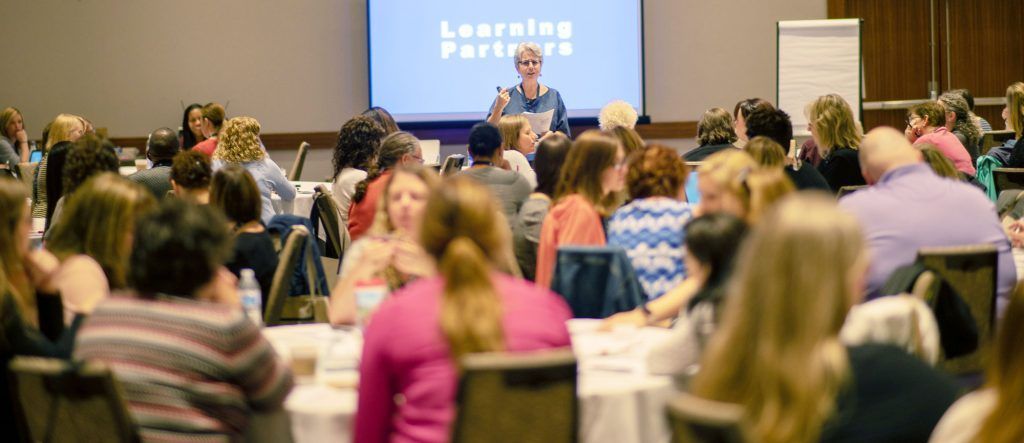BY McCormick Center | May 16, 2018
Building Brighter Futures: Reflecting on the 2018 Leadership Connections Conference
Our founder, Paula Jorde Bloom, created Leadership Connections™ National Conference as a place where early childhood professionals from across the country (and around the world) could connect and learn together in an interactive experience unlike any other. This year’s theme “Building Brighter Futures” focused on how we as the early childhood community could affect change to make the lives of children and families better.
Below is a recap of the 2018 conference. Explore #lcnc18 on Twitter to find golden nuggets attendees shared during the conference.

Pre-conference, Wednesday, May 9
The pre-conference sessions sold out. Judy Jablon (Leading for Children), presented a full-day session on “The Five Commitments of Optimistic Leadership.” Also, Luis Hernandez presented a half-day session on “Mama in Her Pajamas: Checking Our Attitudes About Families,” followed by Janis Keyser’s session, “Inviting Mama in Her Pajamas into Partnership: Building Our Toolkit.”
Taking Charge of Change cohort #25 participants presented their quality improvement plans to their fellow colleagues and mentors. This marked the end of their 10-month cohort and the beginning of cohort #26. (Apply to join cohort #26 by May 31, 2018!)
In the evening, networking events kicked off the conference. Many early childhood leaders traveled by bus to Chicago for a guided tour of the city. Others stayed behind to hear from Dean Judah Viola of National Louis University about “Intentional Networking: Discovering the Value of Connections.”
Day 1, Thursday, May 10
Donna Jacobson, Executive Director of the McCormick Center, opened the conference with a reflection on Paula Jorde Bloom and her far-reaching impact on thousands of children, families, and early childhood leaders. Chip Donohue, Dean of Distance Learning and Continuing Education at Erikson Institute, presented the 2018 Visionary Leadership Award to Barbara Bowman, Co-Founder of Erikson Institute, graduate school in child development, early education, and social work.
Walter Gilliam, Director of The Edward Zigler Center, gave a passionate keynote address on implicit bias and preschool expulsion. He presented evidence that demonstrated that preschool expulsion is not the result of child behavior–it is an adult decision. And he went further, saying “If we are biased in the classroom, it doesn’t impact only that child. We are teaching bias to every child in that classroom.” He also commented, “Access isn’t just about getting in the front door. It’s about not getting kicked out the back door, too.” Read more about Walter’s research here.
In the evening, Marketplace opened. More than 30 vendors greeted attendees with early childhood apps, professional learning books, early childhood classroom furniture and supplies, clothing, and jewelry.
Barbara Bowman shared her visionary leadership journey, advising that leaders need “to be willing to change.” When asked about her greatest accomplishment, Barbara simply responded, “My child.” The McCormick Center Advisory Board presented a donation to the Paula Jorde Bloom scholarship fund as well.
Day 2, Friday, May 11
At the Public Policy Forum, participants heard a keynote from Marica Cox Mitchell, Deputy Executive Director of Early Learning Systems at the National Association for the Education of Young Children (NAEYC), regarding NAEYC’s Power to the Profession initiative and the impact it will have on the early childhood field. The Power to the Profession initiative seeks to create guidelines for the profession in order to advocate for fair compensation and exceptional quality across the field. After the keynote, participants were given the opportunity to ask questions to a panel of speakers their questions about Power to the Profession. The panel included Marica; Teri Talan, Senior Policy Advisor for the McCormick Center; Sherry Cleary, Executive Director of the New York City Early Childhood Professional Development Institute; and Anne Douglass, founding Executive Director of the Institute for Early Education Leadership and Innovation at UMass Boston.
At the Taking Charge of Change™ (TCC) Reunion, cohorts from the past 25 years met to reminisce and reflect on how TCC has changed their lives. Cohort members enjoyed a plated lunch and a slideshow sharing highlights from the program since its inception.
Special interest sessions were held at the end of the day and were an opportunity for participants to explore different programs and initiatives further. Some of the special interest sessions included Aim4Excellence™ (our online national director credential), the L.E.A.D. Early Childhood™ Clearinghouse, and degree programs at National Louis University.
Day 3, Saturday, May 12
Dr. Dana Suskind, Founder and Director of the TMW Center for Early Learning and Public Health, shared insights from current research happening at the center around the importance of language in early childhood. She shared startling statistics about parents’ perspectives of early language development and encouraged attendees to empower parents by sharing their knowledge of the incredible brain development that occurs starting the moment a child is born.





